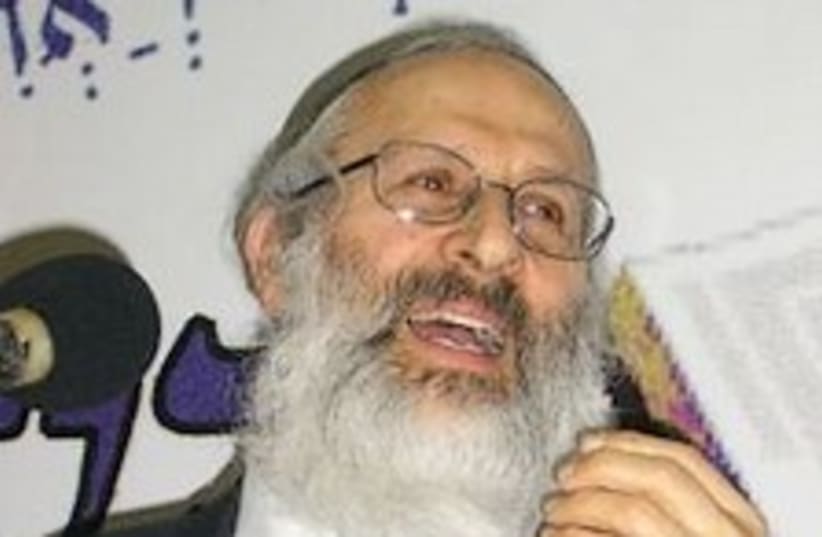RELATED:Benny Gantz meets with chief rabbisInfluential national-religious leader Rabbi Shlomo Aviner, head of the Ateret Yerushalayim yeshiva and rabbi of the Beit El settlement, called on the IDF to cancel female singing performances and also emphasized religious soldiers should request permission from their commanders to absent themselves from any such event. Should permission not be granted, however, Aviner said that under such conditions it was allowable under Jewish law to remain at the performance.“The issue here is one of gaining pleasure [from women singing] by coercion,” he said in an interview with Makor Rishon.“For example, our yeshiva [in the Muslim Quarter of Jerusalem’s Old City] is located on a road along that many Christians pass, singing Christian songs that we are forbidden to listen to. But just because this is the case it doesn’t mean I can’t go to the yeshiva. I hear their singing but I don’t listen,” Aviner explained.However, Rabbi Eliezer Melamed, head of the hesder yeshiva in Har Bracha in the Shomron, has called outright for the dismissal of both the commanding officer of the Bahd 1 Officer’s Training School, Col.Eran Niv, and the expelled soldiers’ battalion commander, Lt.- Col. Uzi Kliger, who originally instructed the cadets to return to the event.“It's not just about the rights of the soldiers to be faithful to their religious principles,” said Melamed in an op-ed published in the Basheva weekly paper on Friday. “These commanders did not only demean the religious cadets but the heritage of [the people of] Israel, and their own ancestors, who throughout the exile observed the Torah and mitzvot [commandments] through self-sacrifice,” he said.“They do not deserve to be IDF commanders.”Rabbi Yuval Cherlow, head of a hesder yeshiva in Petah Tikva, gave a ruling similar to Rabbi Aviner saying it is completely permissible to enter into a situation, such as women singing, if there was no other choice.“It is incredibly important that the IDF is a Jewish army acting according to Jewish law as part of the Jewish democratic state,” he stressed in a statement on the issue, saying soldiers should also struggle for their rights not to be present at cultural events involving women singing.“At the same time, when we’re talking about a military ceremony involving the whole unit, there is nothing more correct from a halachic perspective than to be there with everyone else.This should be the a priori position of the army and the military rabbinate,” Cherlow stated.“Singing at ceremonies is an integral part of secular culture in the State of Israel, including women singing,” he continued, saying that in order to maintain a united army it is necessary to understand that that there are things that are important to different elements of society and that “different halachic tools can be used” to accommodate this kind of situation.
Rabbis differ over women singing in army
“The issue here is one of gaining pleasure [from women singing] by coercion,” says Rabbi Shlomo Aviner.

RELATED:Benny Gantz meets with chief rabbisInfluential national-religious leader Rabbi Shlomo Aviner, head of the Ateret Yerushalayim yeshiva and rabbi of the Beit El settlement, called on the IDF to cancel female singing performances and also emphasized religious soldiers should request permission from their commanders to absent themselves from any such event. Should permission not be granted, however, Aviner said that under such conditions it was allowable under Jewish law to remain at the performance.“The issue here is one of gaining pleasure [from women singing] by coercion,” he said in an interview with Makor Rishon.“For example, our yeshiva [in the Muslim Quarter of Jerusalem’s Old City] is located on a road along that many Christians pass, singing Christian songs that we are forbidden to listen to. But just because this is the case it doesn’t mean I can’t go to the yeshiva. I hear their singing but I don’t listen,” Aviner explained.However, Rabbi Eliezer Melamed, head of the hesder yeshiva in Har Bracha in the Shomron, has called outright for the dismissal of both the commanding officer of the Bahd 1 Officer’s Training School, Col.Eran Niv, and the expelled soldiers’ battalion commander, Lt.- Col. Uzi Kliger, who originally instructed the cadets to return to the event.“It's not just about the rights of the soldiers to be faithful to their religious principles,” said Melamed in an op-ed published in the Basheva weekly paper on Friday. “These commanders did not only demean the religious cadets but the heritage of [the people of] Israel, and their own ancestors, who throughout the exile observed the Torah and mitzvot [commandments] through self-sacrifice,” he said.“They do not deserve to be IDF commanders.”Rabbi Yuval Cherlow, head of a hesder yeshiva in Petah Tikva, gave a ruling similar to Rabbi Aviner saying it is completely permissible to enter into a situation, such as women singing, if there was no other choice.“It is incredibly important that the IDF is a Jewish army acting according to Jewish law as part of the Jewish democratic state,” he stressed in a statement on the issue, saying soldiers should also struggle for their rights not to be present at cultural events involving women singing.“At the same time, when we’re talking about a military ceremony involving the whole unit, there is nothing more correct from a halachic perspective than to be there with everyone else.This should be the a priori position of the army and the military rabbinate,” Cherlow stated.“Singing at ceremonies is an integral part of secular culture in the State of Israel, including women singing,” he continued, saying that in order to maintain a united army it is necessary to understand that that there are things that are important to different elements of society and that “different halachic tools can be used” to accommodate this kind of situation.